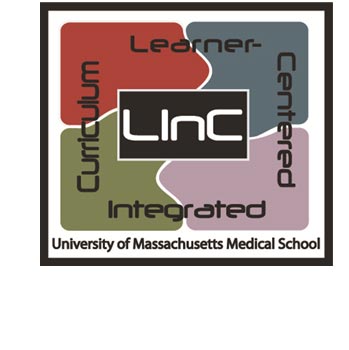 |
A milestone was quietly reached on Monday, Feb. 6, when the Educational Policy Committee unanimously approved the final phase of the new School of Medicine curriculum, symbolizing the culmination of years of careful work by more than 500 members of the UMass Medical School community.
When the process of redesigning the curriculum began in 2004, the goal was beyond ambitious: to completely re-imagine medical education from top to bottom with involvement from as many stakeholders as possible, from first-year students to senior staff. The resulting Learner-centered Integrated Curriculum, or LInC, incorporates innovations in teaching and learning as well as the latest national standards for medical education, and is designed to address the six competencies required of all School of Medicine graduates: physician as professional, scientist, communicator, clinical problem solver, patient and community advocate, and person.
“The completion of LInC illuminates the collaborative environment of UMass Medical School,” said Terence R. Flotte, MD, the Celia and Isaac Haidak Professor of Medicine and dean of the School of Medicine, who joined UMMS in 2007 and quickly became an essential leader of the curriculum redesign process. “More than 400 faculty from across the UMass Medical School community collaborated to create the new curriculum, which is designed to meet the changing needs of health care.
“The LInC curriculum supports patient-centered care by educating and training our future physicians to be scientists, clinical problem solvers and professionals, as well as communicators, people and their patients’ advocates. I am proud to have been a part of creating the foundation for preparing physicians of the future,” added Dr. Flotte, who is also executive deputy chancellor, provost and professor of pediatrics.
The newly approved fourth-year curriculum, called Advanced Studies, begins in May 2014. In addition to the 24 electives, Sub-Internship and the Transition to Internship program requirements in the fourth year, three new courses have been created: Emergency Clinical Problem Solver, Advanced Biomedical and Translational Sciences, and the Capstone course.
The Emergency Clinical Problem Solver course provides an opportunity for medical students to integrate knowledge and skills they’ve acquired over their first three years. Students will be called upon to evaluate patients, generate differential diagnoses and perform patient management in undifferentiated urgent situations and adapt them as needed across different clinical, small group and high-fidelity simulation settings. The course reinforces multidisciplinary teamwork, professional behavior and integration of basic science knowledge.
The Advanced Biomedical and Translational Sciences course will provide students with an opportunity to revisit and explore one or more specific aspects of foundational biomedical or translational science in greater depth than their foundational years and in the context of their personal interests and career goals in medicine. These experiences will include a return to the foundational sciences in a more advanced level, an opportunity for each student to meet a self-identified gap of knowledge in a related area and to share that new knowledge with peers.
The Capstone course is one of the most anticipated features of the new curriculum because it allows students to concentrate on scholarly projects that meet their own area of passion and in the area of any of the school’s six competencies. Working with a faculty advisor, each student will apply the knowledge and skills they have acquired throughout their three years of study to address an issue in areas ranging from clinical, basic science, public health or social problems to medical humanities. These projects will help to deepen students’ application of lifelong learning skills as well as his or her understanding of an issue related to medicine that is personally important or meaningful.
“It has been such a great privilege to work with our students, faculty and residents to bring their vision for the future of medical education and medical practice to life,” said Melissa Fischer, MD, MEd, associate professor of medicine and associate dean for undergraduate medical education. “This new curriculum recognizes the values of student responsibility and choice in learning, engages our world-class faculty in new ways to push the frontiers of research and clinical practice, supports students through enhanced mentorship and professional development and connects the science and practice that make up the art of medicine.”
Related links on UMassMedNow:
Year three of new curriculum has clinical care at its core
Second year of new medical school curriculum approved
A new way of teaching medicine begins with School of Medicine’s entering class
Inaugural class of Learning Community Mentors named
New year, new ways to learn: Technologically enhanced teaching space opens